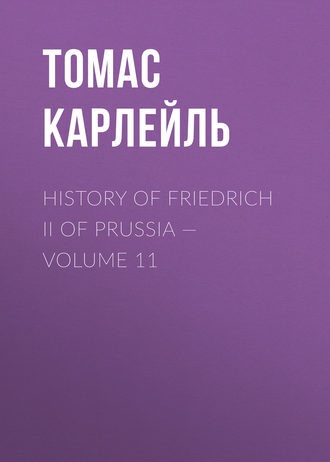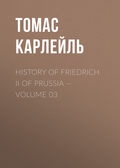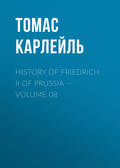
Томас Карлейль
History of Friedrich II of Prussia — Volume 11
AND EVERY ONE SHALL GET TO HEAVEN IN HIS OWN WAY
Here is another little fact which had immense renown at home and abroad, in those summer months and long afterwards.
June 22d, 1740, the GEISTLICHE DEPARTEMENT (Board of Religion, we may term it) reports that the Roman-Catholic Schools, which have been in use these eight years past, for children of soldiers belonging to that persuasion, "are, especially in Berlin, perverted, directly in the teeth of Royal Ordinance, 1732, to seducing Protestants into Catholicism;" annexed, or ready for annexing, "is the specific Report of Fiscal-General to this effect:"—upon which, what would it please his Majesty to direct us to do?
His Majesty writes on the margin these words, rough and ready, which we give with all their grammatical blotches on them; indicating a mind made up on one subject, which was much more dubious then, to most other minds, than it now is:—
"Die Religionen Musen (MUSSEN) alle Tollerirt (TOLERIRT) werden, und Mus (MUSS) der Fiscal nuhr (NUR) das Auge darauf haben, das (DASS) keine der andern abrug Tuhe (ABBRUCH THUE), den (DENN) hier mus (MUSS) ein jeder nach seiner Fasson Selich (FACON SELIG) werden." [Preuss, Thronbesteigung, p. 333; Rodenbeck, IN DIE.]
Which in English might run as follows:—
"All Religions must be tolerated (TOLLERATED), and the Fiscal must have an eye that none of them make unjust encroachment on the other; for in this Country every man must get to Heaven in his own way."
Wonderful words; precious to the then leading spirits, and which (the spelling and grammar being mended) flew abroad over all the world: the enlightened Public everywhere answering his Majesty, once more, with its loudest "Bravissimo!" on this occasion. With what enthusiasm of admiring wonder, it is now difficult to fancy, after the lapse of sixscore years! And indeed, in regard to all these worthy acts of Human Improvement which we are now concerned with, account should be held (were it possible) on Friedrich's behalf how extremely original, and bright with the splendor of new gold, they then were: and how extremely they are fallen dim, by general circulation, since that. Account should be held; and yet it is not possible, no human imagination is adequate to it, in the times we are now got into.
FREE PRESS, AND NEWSPAPERS THE BEST INSTRUCTORS
Toleration, in Friedrich's spiritual circumstances, was perhaps no great feat to Friedrich: but what the reader hardly expected of him was Freedom of the Press, or an attempt that way! From England, from Holland, Friedrich had heard of Free Press, of Newspapers the best Instructors: it is a fact that he hastens to plant a seed of that kind at Berlin; sets about it "on the second day of his reign," so eager is he. Berlin had already some meagre INTELLIGENZ-BLATT (Weekly or Thrice-Weekly Advertiser), perhaps two; but it is a real Newspaper, frondent with genial leafy speculation, and food for the mind, that Friedrich is intent upon: a "Literary-Political Newspaper," or were it even two Newspapers, one French, one German; and he rapidly makes the arrangements for it; despatches Jordan, on the second day, to seek some fit Frenchman. Arrangements are soon made: a Bookselling Printer, Haude, Bookseller once to the Prince-Royal,—whom we saw once in a domestic flash-of-lightning long ago, [Antea, Book vi. c. 7.]—is encouraged to proceed with the improved German article, MERCURY or whatever they called it; vapid Formey, a facile pen, but not a forcible, is the Editor sought out by Jordan for the French one. And, in short, No. 1 of Formey shows itself in print within a month; ["2d July, 1740:" Preuss, Thronbesteigung, p. 330; and Formey, Souvenirs, i. 107, rectified by the exact Herr Preuss.] and Haude and he, Haude picking up some grand Editor in Hamburg, do their best for the instruction of mankind.
In not many months, Formey, a facile and learned but rather vapid gentleman, demitted or was dismissed; and the Journals coalesced into one, or split into two again; and went I know not what road, or roads, in time coming,—none that led to results worth naming. Freedom of the Press, in the case of these Journals, was never violated, nor was any need for violating it. General Freedom of the Press Friedrich did not grant, in any quite Official or steady way; but in practice, under him, it always had a kind of real existence, though a fluctuating, ambiguous one. And we have to note, through Friedrich's whole reign, a marked disinclination to concern himself with Censorship, or the shackling of men's poor tongues and pens; nothing but some officious report that there was offence to Foreign Courts, or the chance of offence, in a poor man's pamphlet, could induce Friedrich to interfere with him or it,—and indeed his interference was generally against his Ministers for having wrong informed him, and in favor of the poor Pamphleteer appealing at the fountain-head. [Anonymous (Laveaux), Vie de Frederic II., Roi de Prusse (Strasbourg, 1787), iv. 82. A worthless, now nearly forgotten Book; but competent on this point, if on any; Laveaux (a handy fellow, fugitive Ex-Monk, with fugitive Ex-Nun attached) having lived much at Berlin, always in the pamphleteering line.] To the end of his life, disgusting Satires against him, Vie Privee by Voltaire, Matinees du Roi de Prusse, and still worse Lies and Nonsenses, were freely sold at Berlin, and even bore to be printed there, Friedrich saying nothing, caring nothing. He has been known to burn Pamphlets publicly,—one Pamphlet we shall ourselves see on fire yet;—but it was without the least hatred to them, and for official reasons merely. To the last, he would answer his reporting Ministers, "LE PRESSE EST LIBRE (Free press, you must consider)!"—grandly reluctant to meddle with the press, or go down upon the dogs barking at his door. Those ill effects of Free Press (first stage of the ill effects) he endured in this manner; but the good effects seem to have fallen below his expectation. Friedrich's enthusiam for freedom of the press, prompt enough, as we see, never rose to the extreme pitch, and it rather sank than increased as he continued his experiences of men and things. This of Formey and the two Newspapers was the only express attempt he made in that direction; and it proved a rather disappointing one. The two Newspapers went their way thenceforth, Friedrich sometimes making use of them for small purposes, once or twice writing an article himself, of wildly quizzical nature, perhaps to be noticed by us when the time comes; but are otherwise, except for chronological purposes, of the last degree of insignificance to gods or men.
"Freedom of the Press," says my melancholic Friend, "is a noble thing; and in certain Nations, at certain epochs, produces glorious effects,—chiefly in the revolutionary line, where that has grown indispensable. Freedom of the Press is possible, where everybody disapproves the least abuse of it; where the 'Censorship' is, as it were, exercised by all the world. When the world (as, even in the freest countries, it almost irresistibly tends to become) is no longer in a case to exercise that salutary function, and cannot keep down loud unwise speaking, loud unwise persuasion, and rebuke it into silence whenever printed, Freedom of the Press will not answer very long, among sane human creatures: and indeed, in Nations not in an exceptional case, it becomes impossible amazingly soon!"—
All these are phenomena of Friedrich's first week. Let these suffice as sample, in that first kind. Splendid indications surely; and shot forth in swift enough succession, flash following flash, upon an attentive world. Betokening, shall we say, what internal sea of splendor, struggling to disclose itself, probably lies in this young King; and how high his hopes go for mankind and himself? Yes, surely;—and introducing, we remark withal, the "New Era," of Philanthropy, Enlightenment and so much else; with French Revolution, and a "world well suicided" hanging in the rear! Clearly enough, to this young ardent Friedrich, foremost man of his Time, and capable of DOING its inarticulate or dumb aspirings, belongs that questionable honor; and a very singular one it would have seemed to Friedrich, had he lived to see what it meant!
Friedrich's rapidity and activity, in the first months of his reign, were wonderful to mankind; as indeed through life he continued to be a most rapid and active King. He flies about; mustering Troops, Ministerial Boards, passing Edicts, inspecting, accepting Homages of Provinces;—decides and does, every day that passes, an amazing number of things. Writes many Letters, too; finds moments even for some verses; and occasionally draws a snatch of melody from his flute.
His Letters are copiously preserved; but, as usual, they are in swift official tone, and tell us almost nothing. To his Sisters he writes assurances; to his friends, his Suhms, Duhans, Voltaires, eager invitations, general or particular, to come to him. "My state has changed," is his phrase to Voltaire and other dear intimates; a tone of pensiveness, at first even of sorrow and pathos traceable in it; "Come to me,"—and the tone, in an old dialect, different from Friedrich's, might have meant, "Pray for me." An immense new scene is opened, full of possibilities of good and bad. His hopes being great, his anxieties, the shadow of them, are proportionate. Duhan (his good old Tutor) does arrive, Algarotti arrives, warmly welcomed, both: with Voltaire there are difficulties; but surely he too will, before long, manage to arrive. The good Suhm, who had been Saxon Minister at Petersburg to his sorrow this long while back, got in motion soon enough; but, alas, his lungs were ruined by the Russian climate, and he did not arrive. Something pathetic still in those final LETTERS of Suhm. Passionately speeding on, like a spent steed struggling homeward; he has to pause at Warsaw, and in a few days dies there,—in a way mournful to Friedrich and us! To Duhan, and Duhan's children afterwards, he was punctually, not too lavishly, attentive; in like manner to Suhm's Nephews, whom the dying man had recommended to him.—We will now glance shortly at a second and contemporaneous phasis of Friedrich's affairs.
INTENDS TO BE PRACTICAL WITHAL, AND EVERY INCH A KING
Friedrich is far indeed from thinking to reduce his Army, as the Foreign Editor imagines. On the contrary, he is, with all industry, increasing it. He changed the Potsdam Giants into four regiments of the usual stature; he is busy bargaining with his Brother-in-law of Brunswick, and with other neighbors, for still new regiments;—makes up, within the next few months, Eight Regiments, an increase of, say, 16,000 men. It would appear he means to keep an eye on the practicalities withal; means to have a Fighting-Apparatus of the utmost potentiality, for one thing! Here are other indications.
We saw the Old Dessauer, in a sad hour lately, speaking beside the mark; and with what Olympian glance, suddenly tearless, the new King flashed out upon him, knowing nothing of "authority" that could reside in any Dessauer. Nor was that a solitary experience; the like befell wherever needed. Heinrich of Schwedt, the Ill Margraf, advancing with jocose countenance in the way of old comradeship, in those first days, met unexpected rebuff, and was reduced to gravity on the sudden: "JETZT BIN ICH KONIG,—My Cousin, I am now King!" a fact which the Ill Margraf could never get forgotten again. Lieutenant-General Schulenburg, too, the didactic Schulenburg, presuming, on old familiarity, and willing to wipe out the misfortune of having once condemned us to death, which nobody is now upbraiding him with, rushes up from Landsberg, unbidden, to pay his congratulations and condolences, driven by irresistible exuberance of loyalty: to his astonishment, he is reminded (thing certain, manner of the thing not known), That an Officer cannot quit his post without order; that he, at this moment, ought to be in Landsberg! [Stenzel, iv. 41; Preuss, Thronbesteigung; &c.] Schulenburg has a hard old military face; but here is a young face too, which has grown unexpectedly rigorous. Fancy the blank look of little Schulenburg; the light of him snuffed out in this manner on a sudden. It is said he had thoughts of resigning, so indignant was he: no doubt he went home to Landsberg gloomily reflective, with the pipe-clay of his mind in such a ruinous condition. But there was no serious anger, on Friedrich's part; and he consoled his little Schulenburg soon after, by expediting some promotion he had intended him. "Terribly proud young Majesty this," exclaim the sweet voices. And indeed, if they are to have a Saturnian Kingdom, by appearance it will be on conditions only!
Anticipations there had been, that old unkindnesses against the Crown-Prince, some of which were cruel enough, might be remembered now: and certain people had their just fears, considering what account stood against them; others, VICE VERSA, their hopes. But neither the fears nor the hopes realized themselves; especially the fears proved altogether groundless. Derschau, who had voted Death in that Copenick Court-Martial, upon the Crown-Prince, is continued in his functions, in the light of his King's countenance, as if nothing such had been. Derschau, and all others so concerned; not the least question was made of them, nor of what they had thought or had done or said, on an occasion once so tragically vital to a certain man.
Nor is reward much regulated by past services to the Crown-Prince, or even by sufferings endured for him. "Shocking ingratitude!" exclaim the sweet voices here too,—being of weak judgment, many of them! Poor Katte's Father, a faithful old Soldier, not capable of being more, he does, rather conspicuously, make Feldmarschall, make Reichsgraf; happy, could these honors be a consolation to the old man. The Munchows of Custrin,—readers remember their kindness in that sad time; how the young boy went into petticoats again, and came to the Crown-Prince's cell with all manner of furnishings,—the Munchows, father and sons, this young gentleman of the petticoats among them, he took immediate pains to reward by promotion: eldest son was advanced into the General Directorium; two younger sons, to Majorship, to Captaincy, in their respective Regiments; him of the petticoats "he had already taken altogether to himself," [Preuss, i. 66.] and of him we shall see a glimpse at Wilhelmina's shortly, as a "milkbeard (JEUNE MORVEUX)" in personal attendance on his Majesty. This was a notable exception. And in effect there came good public service, eminent some of it, from these Munchows in their various departments. And it was at length perceived to have been, in the main, because they were of visible faculty for doing work that they had got work to do; and the exceptional case of the Munchows became confirmatory of the rule.
Lieutenant Keith, again, whom we once saw galloping from Wesel to save his life in that bad affair of the Crown-Prince's and his, was nothing like so fortunate. Lieutenant Keith, by speed on that Wesel occasion, and help of Chesterfield's Secretary, got across to England; got into the Portuguese service; and has there been soldiering, very silently, these ten years past,—skin and body safe, though his effigy was cut in four quarters and nailed to the gallows at Wesel;—waiting a time that would come. Time being come, Lieutenant Keith hastened home; appealed to his effigy on the gallows;—and was made a Lieutenant-Colonel merely, with some slight appendages, as that of STALLMEISTER (Curator of the Stables) and something else; income still straitened, though enough to live upon. [Preuss, Friedrich mit Verwandten und Freunden, p. 281.] Small promotion, in comparison with hope, thought the poor Lieutenant; but had to rest satisfied with it; and struggle to understand that perhaps he was fit for nothing bigger, and that he must exert himself to do this small thing well. Hardness of heart in high places! Friedrich, one is glad to see, had not forgotten the poor fellow, could he have done better with him. Some ten years hence, quite incidentally, there came to Keith, one morning, a fine purse of money from his Majesty, one pretty gift in Keith's experience;—much the topic in Berlin, while a certain solemn English gentleman happened to be passing that way (whom we mean to detain a little by and by), who reports it for us with all the circumstances. [Sir Jonas Hanway, Travels, &c. (London, 1753), ii. 202. Date of the Gift is 1750.]
Lieutenant Spaen too had got into trouble for the Crown-Prince's sake, though we have forgotten him again; had "admitted Katte to interviews," or we forget what;—had sat his "year in Spandau" in consequence; been dismissed the Prussian service, and had taken service with the Dutch. Lieutenant Spaen either did not return at all, or disliked the aspects when he did, and immediately withdrew to Holland again. Which probably was wise of him. At a late period, King Friedrich, then a great King, on one of his Cleve Journeys, fell in with Spaen; who had become a Dutch General of rank, and was of good manners and style of conversation: King Friedrich was charmed to see him; became his guest for the night; conversed delightfully with him, about old Prussian matters and about new; and in the colloquy never once alluded to that interesting passage in his young life and Spaen's. [Nicolai, Anekdoten, vi. 178.] Hard as polished steel! thinks Spaen perhaps; but, if candid, must ask himself withal, Are facts any softer, or the Laws of Kingship to a man that holds it?—Keith silently did his Lieutenant-Colonelcy with the appendages, while life lasted: of the Page Keith, his Brother, who indeed had blabbed upon the Prince, as we remember, and was not entitled to be clamorous, I never heard that there was any notice taken; and figure him to myself as walking with shouldered firelock, a private Fusileer, all his life afterwards, with many reflections on things bygone. [These and the other Prussian Keiths are all of Scotch extraction; the Prussians, in natural German fashion, pronounce their name KAH-IT (English "KITE" with nothing of the Y in it), as may be worth remembering in a more important instance.]
Old friendship, it would seem, is without weight in public appointments here: old friends are somewhat astonished to find this friend of theirs a King every inch! To old comrades, if they were useless, much more if they were worse than useless, how disappointing! "One wretched Herr [name suppressed, but known at the time, and talked of, and whispered of], who had, like several others, hoping to rise that way, been industrious in encouraging the Crown-Prince's vices as to women, was so shocked at the return he now met, that in despair he hanged himself in LobeJun." (Lobegun, Magdeburg Country): here is a case for the humane! [Kuster, Characterzuge des &c. von Saldern (Berlin, 1793), p. 63.]
Friend Keyserling himself, "Caesarion" that used to be, can get nothing, though we love him much; being an idle topsy-turvy fellow with revenues of his own. Jordan, with his fine-drawn wit, French logics, LITERARY TRAVELS, thin exactitude; what can be done for Jordan? Him also his new Majesty loves much; and knows that, without some official living, poor Jordan has no resource. Jordan, after some waiting and survey, is made "Inspector of the Poor;"—busy this Autumn looking out for vacant houses, and arrangements for the thousand spinning women;—continues to be employed in mixed literary services (hunting up of Formey, for Editor, was one instance), and to be in much real intimacy. That also was perhaps about the real amount of amiable Jordan. To get Jordan a living by planting him in some office which he could not do; to warm Jordan by burning our royal bed for him: that had not entered into the mind of Jordan's royal friend. The Munchows he did promote; the Finks, sons of his Tutor Finkenstein: to these and other old comrades, in whom he had discovered fitness, it is no doubt abundantly grateful to him to recognize and employ it. As he notably does, in these and in other instances. But before all things he has decided to remember that he is King; that he must accept the severe laws of that trust, and do IT, or not have done anything.
An inverse sign, pointing in the same way, is the passionate search he is making in Foreign Countries for such men as will suit him. In these same months, for example, he bethinks him of two Counts Schmettau, in the Austrian Service, with whom he had made acquaintance in the Rhine Campaign; of a Count von Rothenburg, whom he saw in the French Camp there; and is negotiating to have them if possible. The Schmettaus are Prussian by birth, though in Austrian Service; them he obtains under form of an Order home, with good conditions under it; they came, and proved useful men to him. Rothenburg, a shining kind of figure in Diplomacy as well as Soldiership, was Alsatian German, foreign to Prussia; but him too Friedrich obtained, and made much of, as will be notable by and by. And in fact the soul of all these noble tendencies in Friedrich, which surely are considerable, is even this, That he loves men of merit, and does not love men of none; that he has an endless appetite for men of merit, and feels, consciously and otherwise, that they are the one thing beautiful, the one thing needful to him.
This, which is the product of all fine tendencies, is likewise their centre or focus out of which they start again, with some chance of fulfilment;—and we may judge in how many directions Friedrich was willing to expand himself, by the multifarious kinds he was inviting, and negotiating for. Academicians,—and not Maupertuis only, but all manner of mathematical geniuses (Euler whom he got, at Gravesande, Muschenbroek whom he failed of); and Literary geniuses innumerable, first and last. Academicians, Musicians, Players, Dancers even; much more Soldiers and Civil-Service men: no man that carries any honest "CAN DO" about with him but may expect some welcome here. Which continued through Friedrich's reign; and involved him in much petty trouble, not always successful in the lower kinds of it. For his Court was the cynosure of ambitious creatures on the wing, or inclined for taking wing: like a lantern kindled in the darkness of the world;—and many owls impinged upon him; whom he had to dismiss with brevity.
Perhaps it had been better to stand by mere Prussian or German merit, native to the ground? Or rather, undoubtedly it had! In some departments, as in the military, the administrative, diplomatic, Friedrich was himself among the best of judges: but in various others he had mainly (mainly, by no means blindly or solely) to accept noise of reputation as evidence of merit; and in these, if we compute with rigor, his success was intrinsically not considerable. The more honor to him that he never wearied of trying. "A man that does not care for merit," says the adage, "cannot himself have any." But a King that does not care for merit, what shall we say of such a King!—






